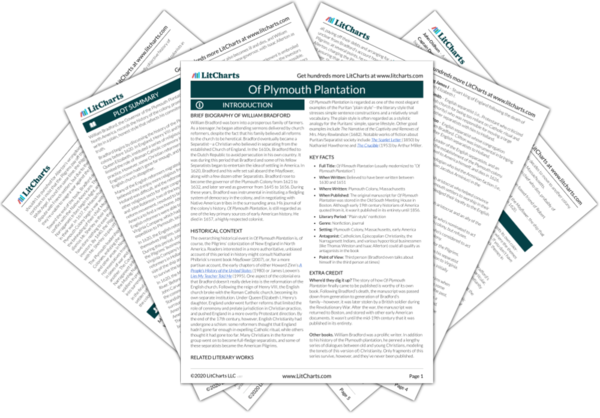Summary
Analysis
In the year 1631, Ashley and Allerton are no longer a part of the Pilgrims’ business affairs, thanks to “the hand of God.” Business begins to run smoothly, and Winslow sends supplies from England. However, Sherley charges the shipment from the White Angel to the Pilgrims, despite the fact that, according to Allerton, the White Angel brought no provisions for them.
With Ashley and Allerton out of the picture, the Pilgrims resume making money and sending supplies back across the Atlantic. However, there’s still the matter of the White Angel, a vessel that, at least in theory, was meant to bring the supplies that keep the colony running.
Themes
Quiz
Test Yourself
Bradford receives a letter from Winslow explaining that Allerton has taken the White Angel for himself and intends to sell it in Spain, rather than allowing it to make shipments on the Pilgrims’ behalf. “To this day,” Bradford reports, Sherley and Allerton control the ship. On November 19th, 1631, Sherley sends a letter to Bradford, regretfully explaining that the Pilgrims will need to pay for the ship’s costs.
English businessmen demand some payment for the White Angel, and since Allerton is nowhere to be found, Plymouth must make up the cost of the vessel. This seems pretty unfair, since the Pilgrims have already been harmed by the White Angel’s absence, and shouldn’t be punished for Allerton’s misconduct.
Themes
Quiz
Test Yourself
Bradford offers a few thoughts about Sherley’s letters. First, it seems clear that it was Allerton’s idea to purchase the White Angel and use it for his own profit. Furthermore, after the White Angel was wrecked in the storm, Allerton tried to charge the Pilgrims for his losses, believing that he was entitled to their help considering all he’d done for them in the past. Bradford prays that one day, Allerton will “see the evil of his ways.” Bradford also notes that the White Angel was clearly never intended for Pilgrims, as the bill of sale was made out to Sherley’s own name, and Allerton later testified to the same effect in a trial on September 7, 1639.
Bradford’s commentary here shows both the worldly practicality and the religious high-mindedness of the Pilgrims—and how they link these together without seeming to see any contradictions. On one hand, Bradford is savvy and meticulous about Allerton’s relationship with his ship—he produces convincing evidence that the Pilgrims shouldn’t be charged for the vessel. Bradford then goes on to make a religious judgment of Allerton, and takes the generous (if passive-aggressive) approach of saying that he’ll pray for Allerton’s soul.
Themes
Quiz
Test Yourself
Bradford will now go over the details of Mr. Allerton’s accounts, which weren’t fully understood until some time after 1631. As early as the late 1620s, it’s clear, Allerton was in debt. Allerton transported shipments of beaver fur back from America to sell for his own profit; in doing so, Allerton limited the profitability of the Pilgrims’ colony. Allerton also pursued poor business ventures to get out of debt—at one point, he hired a “drunken crew” to make a shipment, and lost all the goods aboard the vessel.
In retrospect, Allerton was a corrupt businessman for much longer than Bradford realized at the time. As early as the 1620s, Allerton was selling material for his own profit instead of looking out for the good of the colony. Bradford again emphasizes how his “villains” are associated with other sins like drunkenness, and are punished by God for their immorality.
Themes
Quiz
Test Yourself
Get the entire Of Plymouth Plantation LitChart as a printable PDF.

Also in 1631, a man named Sir Christopher Gardiner arrives in Massachusetts. Gardiner is a descendant of the notorious Bishop of Winchester, who persecuted many of “God’s saints” in the previous century. Gardiner is known to live with a “comely young woman” believed to be his concubine. In Massachusetts, he flees from his community to live with Indians. Later on, Indians approach Bradford about arresting Gardiner, and Bradford offers them a reward for doing so, on the condition that they bring him alive. With Gardiner in custody, Bradford sends him to John Winthrop in Boston.
Bradford emphasizes Gardiner’s sinful qualities by noting that he’s descended from a notoriously corrupt Bishop who exemplified the corruption of the old Catholic Church (especially as perceived by Protestants). The passage also alludes to John Winthrop, the governor of the Massachusetts Bay Colony and the deliverer of the famous “city on a hill” speech, regarded as one of the key pieces of Puritan writing.
Themes
Quiz
Test Yourself
Gardiner later tries to sue Bradford for allowing the Indians to hurt him during his capture. In early 1632, Gardiner sends his petition to the royal Privy Council in England, asking for a full investigation into the state of affairs in America. The Council issues a degree that the New England colonies (including Plymouth and the Massachusetts Bay), regardless of the actions of individuals, are in excellent health, and that their prosperity is beneficial for England itself.
The Plymouth Plantation passes the Council’s examination: clearly Bradford has created a powerful, well-organized, and economically viable colony in New England. Once again the notion of profitability seems more important than any ideals or religious beliefs supposedly underpinning the colony.
Themes
Quiz
Test Yourself












